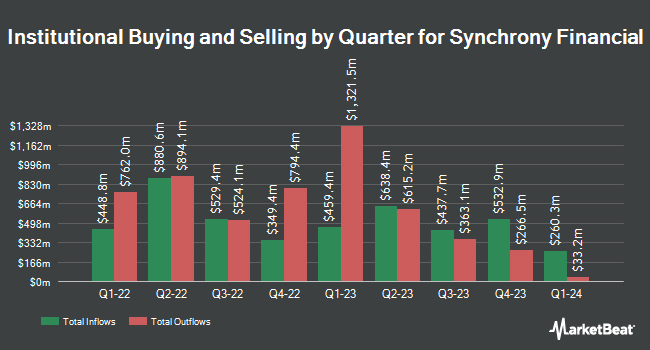Teachers Retirement System of The State of Kentucky lifted its stake in shares of Synchrony Financial (NYSE:SYF - Free Report) by 4.7% during the 4th quarter, according to its most recent 13F filing with the Securities and Exchange Commission. The fund owned 492,351 shares of the financial services provider's stock after purchasing an additional 22,068 shares during the quarter. Teachers Retirement System of The State of Kentucky owned 0.13% of Synchrony Financial worth $32,003,000 as of its most recent filing with the Securities and Exchange Commission.
Other institutional investors have also added to or reduced their stakes in the company. Bogart Wealth LLC acquired a new stake in shares of Synchrony Financial during the fourth quarter valued at about $26,000. TCTC Holdings LLC acquired a new stake in Synchrony Financial during the 4th quarter worth approximately $27,000. Y.D. More Investments Ltd grew its holdings in Synchrony Financial by 111.5% during the 4th quarter. Y.D. More Investments Ltd now owns 480 shares of the financial services provider's stock worth $31,000 after acquiring an additional 253 shares during the last quarter. Raleigh Capital Management Inc. increased its position in Synchrony Financial by 151.4% in the 4th quarter. Raleigh Capital Management Inc. now owns 807 shares of the financial services provider's stock valued at $52,000 after acquiring an additional 486 shares during the period. Finally, EverSource Wealth Advisors LLC grew its stake in shares of Synchrony Financial by 46.5% in the fourth quarter. EverSource Wealth Advisors LLC now owns 810 shares of the financial services provider's stock worth $53,000 after purchasing an additional 257 shares during the last quarter. 96.48% of the stock is currently owned by institutional investors and hedge funds.
Synchrony Financial Stock Down 1.0 %
Synchrony Financial stock traded down $0.50 during trading on Friday, hitting $51.42. 5,001,803 shares of the company were exchanged, compared to its average volume of 3,954,254. The company has a market capitalization of $19.99 billion, a P/E ratio of 6.02, a PEG ratio of 0.71 and a beta of 1.45. The business's 50 day moving average is $53.03 and its 200 day moving average is $60.23. Synchrony Financial has a 52 week low of $40.55 and a 52 week high of $70.93. The company has a current ratio of 1.24, a quick ratio of 1.24 and a debt-to-equity ratio of 1.01.
Synchrony Financial (NYSE:SYF - Get Free Report) last announced its earnings results on Tuesday, April 22nd. The financial services provider reported $1.89 EPS for the quarter, beating the consensus estimate of $1.63 by $0.26. Synchrony Financial had a net margin of 15.36% and a return on equity of 18.30%. The company had revenue of $3.72 billion during the quarter, compared to the consensus estimate of $3.80 billion. Analysts predict that Synchrony Financial will post 7.67 earnings per share for the current year.
Synchrony Financial Increases Dividend
The firm also recently declared a quarterly dividend, which will be paid on Thursday, May 15th. Investors of record on Monday, May 5th will be given a dividend of $0.30 per share. This represents a $1.20 dividend on an annualized basis and a dividend yield of 2.33%. This is an increase from Synchrony Financial's previous quarterly dividend of $0.25. The ex-dividend date is Monday, May 5th. Synchrony Financial's dividend payout ratio (DPR) is presently 11.71%.
Wall Street Analyst Weigh In
Several brokerages recently issued reports on SYF. Evercore ISI lowered their target price on Synchrony Financial from $64.00 to $56.00 and set an "outperform" rating for the company in a research report on Wednesday. Wells Fargo & Company lowered their price objective on Synchrony Financial from $70.00 to $65.00 and set an "overweight" rating for the company in a research report on Wednesday. Compass Point cut Synchrony Financial from a "buy" rating to a "neutral" rating and set a $70.00 target price on the stock. in a report on Tuesday, January 28th. JPMorgan Chase & Co. dropped their price target on shares of Synchrony Financial from $76.00 to $50.00 and set an "overweight" rating on the stock in a research report on Tuesday, April 8th. Finally, Royal Bank of Canada increased their price objective on shares of Synchrony Financial from $70.00 to $73.00 and gave the stock a "sector perform" rating in a research report on Wednesday, January 29th. Nine research analysts have rated the stock with a hold rating, twelve have assigned a buy rating and one has assigned a strong buy rating to the company. According to MarketBeat.com, Synchrony Financial presently has a consensus rating of "Moderate Buy" and an average target price of $63.95.
View Our Latest Stock Report on Synchrony Financial
Synchrony Financial Company Profile
(
Free Report)
Synchrony Financial, together with its subsidiaries, operates as a consumer financial services company in the United States. It provides credit products, such as credit cards, commercial credit products, and consumer installment loans. The company also offers private label credit cards, dual co-brand and general purpose credit cards, short- and long-term installment loans, and consumer banking products; and deposit products, including certificates of deposit, individual retirement accounts, money market accounts, and savings accounts, and sweep and affinity deposits, as well as accepts deposits through third-party securities brokerage firms.
See Also

Before you consider Synchrony Financial, you'll want to hear this.
MarketBeat keeps track of Wall Street's top-rated and best performing research analysts and the stocks they recommend to their clients on a daily basis. MarketBeat has identified the five stocks that top analysts are quietly whispering to their clients to buy now before the broader market catches on... and Synchrony Financial wasn't on the list.
While Synchrony Financial currently has a Moderate Buy rating among analysts, top-rated analysts believe these five stocks are better buys.
View The Five Stocks Here
Need to stretch out your 401K or Roth IRA plan? Use these time-tested investing strategies to grow the monthly retirement income that your stock portfolio generates.
Get This Free Report
Like this article? Share it with a colleague.
Link copied to clipboard.